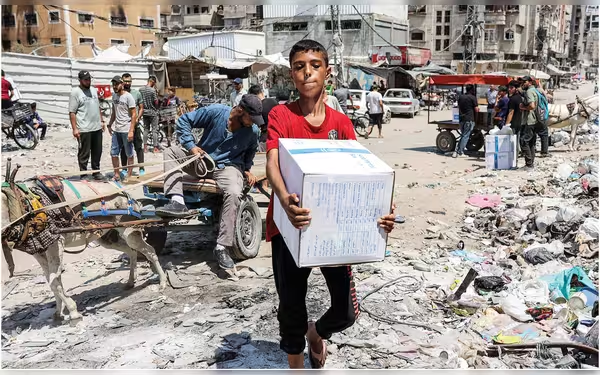Monday, November 25, 2024 08:41 AM
Impact of Israel's UNRWA Ban on Palestinian Refugees
- Israel enforces laws banning UNRWA in occupied territories.
- UNRWA's collapse could lead to humanitarian disaster.
- Over 2 million in Gaza rely on UNRWA services.
 Image Credits: arabnewspk
Image Credits: arabnewspkIsrael's ban on UNRWA threatens vital services for millions of Palestinian refugees in Gaza and the West Bank, risking a humanitarian disaster.
In recent weeks, a significant development has emerged regarding the United Nations Relief and Works Agency for Palestine Refugees in the Near East (UNRWA), which has been providing essential services to millions of Palestinian refugees. Israel is set to enforce new laws that will effectively ban UNRWA from operating in the Israeli-occupied Palestinian territories, a move that has raised serious concerns about the future of humanitarian aid, education, and health care for Palestinians in Gaza and the West Bank.
UNRWA was established in 1949 in response to the displacement of Palestinians during the creation of the Israeli state, an event known as the Nakba, or "catastrophe." Since then, the agency has played a crucial role in supporting Palestinian refugees by providing education, health care, and other vital services. However, Israel has accused UNRWA of being infiltrated by militants, a claim that the agency's leadership strongly denies. They argue that the agency's work is essential for maintaining the rights and dignity of Palestinian refugees.
On October 28, the Israeli parliament passed two laws that will severely restrict UNRWA's ability to operate. The first law prohibits UNRWA from functioning within Israeli territory, while the second law prevents Israeli authorities from engaging with the agency in any capacity. These laws are set to take effect within 90 days and do not offer any alternative means for delivering aid or essential services to the affected populations.
Philippe Lazzarini, the UNRWA commissioner-general, has expressed his deep concern over the potential consequences of these laws. He warns that the collapse of UNRWA would not only lead to a humanitarian disaster for Palestinians but could also fuel radicalization and destabilize the entire region. Lazzarini emphasized that the actions taken by Israel against UNRWA set a dangerous precedent, undermining the international rules-based order that member states are expected to uphold.
Agnes Callamard, the secretary-general of Amnesty International, condemned the Israeli parliament's decision, labeling it as an "unconscionable law" and an attack on the rights of Palestinian refugees. The implications of this ban are particularly dire for Gaza, which is already facing a humanitarian crisis exacerbated by ongoing conflict and a lack of resources. With over 2 million people in Gaza relying on aid, the removal of UNRWA's services could lead to catastrophic outcomes, including severe shortages of food, clean water, and medical supplies.
Despite the challenges, UNRWA has continued to operate under difficult circumstances, providing essential services to Palestinian refugees. However, the agency has faced criticism from Israel, which argues that UNRWA perpetuates the refugee issue by maintaining the notion of a "right of return" for Palestinians. This perspective is viewed by many Palestinians as a fundamental aspect of their identity and rights.
In recent years, accusations against UNRWA have intensified, with claims that some of its employees have ties to Hamas, the governing authority in Gaza. These allegations have led to investigations and funding suspensions from several Western countries, further complicating the agency's ability to function effectively.
As the situation unfolds, the potential impact of Israel's ban on UNRWA cannot be overstated. The agency's services are deeply woven into the fabric of Palestinian society, and their removal would create a significant void in the support system for millions of refugees. The humanitarian crisis in Gaza is already severe, and the loss of UNRWA's assistance would only deepen the suffering of the population.
The impending ban on UNRWA by Israel poses a grave threat to the well-being of Palestinian refugees in Gaza and the West Bank. As the international community watches closely, it is crucial to recognize the importance of humanitarian aid and the role of organizations like UNRWA in providing essential services. The future of millions of Palestinians hangs in the balance, and the need for a sustainable solution to the refugee issue remains more pressing than ever.













